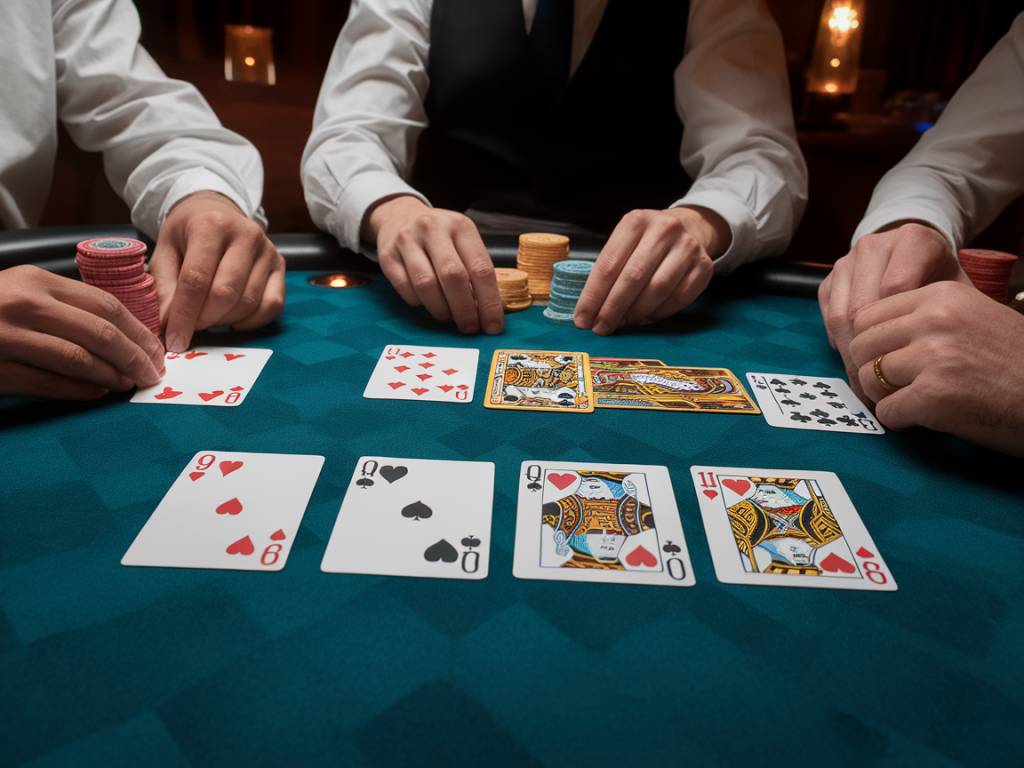« `html
Hey there, poker enthusiasts! 🎲 I’m Ramy, and today I’m diving deep into the fascinating world of Limit Omaha High-Low, a variant across poker and casino games that I’m particularly passionate about. This article aims to break down the rules, strategies, and even some insider tips to help you master this complex yet rewarding game. 🃏
What Is Limit Omaha High-Low?
Limit Omaha High-Low, also known as Omaha 8 or Better, is a split-pot game where players compete for both the high and the low portions of the pot. Unlike No-Limit or Pot-Limit games, this version has a fixed betting structure, making it a game of skill and strategy more than a game of aggressive betting. Think of it as a way to double your fun, as you can potentially win both halves of the pot. 😎
Basic Rules and Setup
Before you dive into strategies, it’s crucial to understand the fundamental rules and setup of Limit Omaha High-Low.
The Deck and Players
The game uses a standard 52-card deck, and it’s typically played with 2-10 players. Each player is dealt four private cards (known as « hole cards »). Five community cards are dealt face-up on the « board. »
Goal
The objective is to make the best possible five-card hand using exactly two of your four hole cards and exactly three of the five community cards. The pot is split between the highest-ranking hand and the lowest-ranking qualifying hand (8 or better).
Hand Rankings
Understanding hand rankings in both high and low hands will give you an edge in Limit Omaha High-Low.
High Hands
The high hand rankings follow the standard poker hand rankings:
Low Hands
For a hand to qualify for the low portion of the pot, it must have five unpaired cards with a rank of 8 or lower. The best possible low hand is A-2-3-4-5, also known as the « wheel. »
Betting Rounds and Structure
Limit Omaha High-Low has four betting rounds, each with its own fixed limits on bet sizes. The structure is typically divided into two limits: the « small bet » for the first two rounds and the « big bet » for the last two rounds.
The Deal
After players receive their hole cards, the first round of betting begins, using the small bet limit.
The Flop
Three community cards are dealt face-up on the board, followed by a round of betting at the small bet limit.
The Turn
The fourth community card is dealt, and betting commences at the big bet limit.
The River
The fifth and final community card is dealt, followed by the final round of betting at the big bet limit.
Strategies for Mastering Limit Omaha High-Low
While there’s no one-size-fits-all strategy, mastering the following concepts can significantly improve your game. 🏆
Starting Hand Selection
Your starting hand is more crucial in Omaha High-Low than in most other poker variants. Aim for hands that have the potential to scoop both the high and the low pots. Good starting hands include A-2-3-X, A-A-2-3, and even suited high cards like A-K-Q-J.
Reading the Board
Always be aware of the board and how it affects both high and low hands. A board with low cards increases the chances of a qualifying low hand, which means you should adjust your strategy accordingly.
Play Tight and Aggressive
In Limit Omaha High-Low, playing tight and aggressively is often a winning strategy. Don’t waste chips on mediocre hands. Instead, focus on strong starting hands that can win both the high and low pots.
Common Mistakes to Avoid
Even seasoned players can fall into common pitfalls. Here are some mistakes you’ll want to avoid.
Overplaying Weak Low Hands
Low hands are only profitable if they can scoop or, at the very least, secure half of the pot. Don’t fall into the trap of chasing a low hand that might not even qualify.
Ignoring High Hands
While chasing the low hand can be tempting, remember that the high hand still constitutes half of the pot. Balance your strategy to optimize chances for both high and low hands.
Underestimating Opponents
Limit Omaha High-Low can attract a range of skill levels. Always take the time to study your opponents, even if they seem inexperienced. Reading their tendencies can give you the edge you need.
Advanced Tips
If you’re looking to take your game to the next level, consider these advanced tips for Limit Omaha High-Low. 🤓
Hand Reading
Advanced players excel at reading opponents’ hands based on their betting patterns. Become adept at determining when an opponent is likely holding a strong low hand, a strong high hand, or both.
Bluff Sparingly
Bluffing in Limit Omaha High-Low can be tricky given the fixed betting limits. However, well-timed bluffs can be very effective, especially when you sense hesitation or weakness in your opponents.
Position Matters
Just like in other poker variants, your position at the table can significantly impact your strategy. Being in a later position allows you to gather more information about your opponents’ hands before making your move.
Recommended Products for Players
As you embark on mastering Limit Omaha High-Low, having the right resources and tools can be invaluable.
Books
Consider reading classics like « Super System » by Doyle Brunson or « Pot-Limit Omaha Poker » by Jeff Hwang for deeper insights into Omaha strategies.
Online Courses
Platforms like MasterClass and Upswing Poker offer comprehensive courses that delve into advanced strategies, hand reading, and much more.
Software
Utilize poker software like PokerTracker or Hold’em Manager to analyze your games and identify areas for improvement.
There you have it! Limit Omaha High-Low is a thrilling game that combines complex strategies with the excitement of split-pot play. By understanding the rules, refining your strategies, and avoiding common mistakes, you can significantly improve your skills and enjoy the game to its fullest. 🃏
« `





